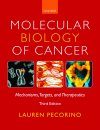![Molecular Biology of Cancer Molecular Biology of Cancer]()
Click to have a closer look
About this book
Contents
Related titles
About this book
Cells in our body undergo tightly regulated replication to enable growth to occur in a precise, and to ensure that damaged or worn out tissues are replaced. Regulation is mediated via many different mechanisms; it is when these mechanisms fail, and regulation is lost, that cancer can result. Recent advances in molecular cell biology have greatly expanded our understanding of the processes and mechanisms which underpin the regulation of cell replication, and what is happening at the molecular level when these fail. The third edition of "The Molecular Biology of Cancer: Mechanisms, Targets, and Therapeutics" offers a fresh approach to the study of the molecular basis of cancer, by showing how our understanding of the defective mechanisms which drive cancer is leading to the development of new targeted therapeutic agents. Opening with an overview of the key hallmarks of cancer as a disease state, the book then leads us through the principal processes that become altered in cancer cells, and explains how the failure of these processes can lead to the onset of cancer. Uniquely, within each chapter, students are shown how this molecular knowledge is being applied to develop new targeted therapeutic strategies. Written with the student learner in mind, the book features a variety of learning features to help students engage with, and master, the concepts presented. The emphasis is not on exhaustive coverage of the field, but on acquiring a solid understanding of the essentials of the subject--and an appreciation of how a theoretical understanding can be transformed into therapeutic benefit. "The Molecular Biology of Cancer" is an invaluable resource for any student wishing to gain an insight into the molecular basis of the disease, and possible solutions for its effective control.
Contents
1: Introduction
2: DNA and stability: mutations versus repair
3: Regulation of gene expression
4: Growth factor signaling and oncogenes
5: The cell cycle
6: Growth inhibition and tumour suppressor genes
7: Apoptosis
8: Stem cells and differentiation
9: Metastasis
10: Infections and inflammation
11: Nutrients, hormones, and gene interactions
12: The cancer industry: drug development and clinical trial design
13: Cancer in the future: focus on diagnostics and immunotherapy
Customer Reviews



































